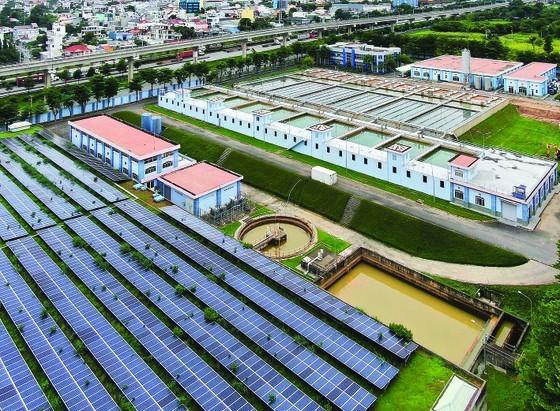Implementing Resolution 98, HCMC is going to install more solar panels on the roofs of state offices and public non-profit units to increase power supply and save budget.
In 2021, the HCMC People’s Committee approved the expansion of the piloting scheme ‘Installing Rooftop Solar Panels in State Office Buildings and Public Non-profit Units in HCMC’. This was in compliance with the policy to develop clean and renewable energy of the Government. After checking, about 1,800 buildings are eligible to this scheme to create a total capacity of 160MWp.
Statistics from the project ‘HCMC Electricity Development Planning in the 2016-2025 Period, with a Vision to 2035’, in the dry season, HCMC experiences 300 hours of sunshine per month (October). The figure for the rainy season (in March) is 150 hours a month. This shows a great potential of solar energy development, especially on rooftop.
Until now, many state office buildings have finished setting up solar panels on their roofs, such as the municipal Department of Science and Technology (with a capacity of 20kWp), Department of Finance (20kWp), the People’s Committees of Phu Nhuan District (88kWp), District 12 (80kWp), District 10 (45kWp), District 4 (34,5kWp).
By the end of 2022, HCMC had had over 14,100 rooftop solar power systems, creating a capacity of more than 355 MWp and accounting for 7 percent of the total electricity capacity of the city. In 2021, with an output of nearly 300 million kWh, solar power in HCMC earned a revenue of VND600 billion (US$25 million).
The HCMC Industry and Trade Department commented that the main energy supply source for HCMC comes from neighboring areas. Therefore, the growth of solar power in the city is a wise choice. According to the project ‘Developing Rooftop Solar Power in HCMC in the 2026-2030 Period’, the city is going to install solar panels to harness 1,505 MWp, accounting for nearly 30 percent of the total potential for this energy type and satisfying 4.3 percent of the city’s power demand. The total investment needed is VND26 trillion ($1.1 billion).
Deputy Director Nguyen Thi Kim Ngoc of the HCMC Industry and Trade Department said that the management of installed solar panels in businesses and households in HCMC has so far observed Decision No.13/2020/QD-TTg by the Prime Minister and Circular No.18/2020 by the Ministry of Industry and Trade.
Accordingly, owners of the chosen building provide necessary information, namely location, capacity scale, power transmission line, and expected connection point. Then the power unit considers the connection as well as power transmit ability to be the foundation for an agreement signed by both sides. After installation, building owners send related dossiers to the power unit for technical checking, followed by a power purchase contract. When this is signed, power from the solar panels here can join the city’s electricity network for exploitation. In the case of law violation, the power unit must temporarily stop the power connection, prepare a report to the Ministry of Industry and Trade for punishments in compliance with applicable laws.
Deputy General Director Bui Trung Kien of Electricity Vietnam (EVN) – HCMC said that the main point now is a clear installation procedure issued by relevant state agencies for people to follow. Installation-related issues (fire prevention, architecture, aesthetics) must be handled for rooftop solar energy in HCMC to develop as stated in Resolution 98.
More importantly, it is necessary to identify whether the investment comes from public sources or the Public-Private Partnership (PPP) under the current financial mechanism. When these details are clear, the procedure can be done quickly, and HCMC can enjoy more power from rooftop solar panels.
The HCMC Industry and Trade Department stated that this August, it is finishing the procedure to install rooftop solar panels on state office buildings. The paper will be submitted to the HCMC People’s Committee for approval. The installation is expected to begin this September.
EVN-HCMC stressed that the direction of developing rooftop solar energy is sensible as it takes good advantage of current rooftops citywide as well as the rich amount of sunshine to harness power to supply daily operations of offices. Calculations show that after payback, HCMC can save up to VND400 billion ($16.7 million) of electricity bills. EVN-HCMC will deliver technical and financial consultation if needed.

